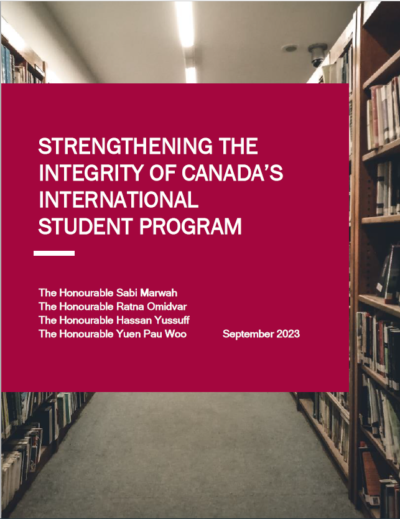A discussion paper issued by four Canadian Senators on 20 September 2023 examines the key challenges threatening the integrity of Canada’s international student program. Education agents are included on the list along with tuition, private colleges, sexual abuse, housing, employment and TR to PR pathways.
The criticism of education agents is scathing:

Among the negative consequences of agent involvement is they may refer international students to programs that are ineligible for a PGWP, thereby denying international students the ability to work in Canada and immigrate following graduation.
Another integrity challenge is agents falsify documentation, such as education credentials, grades, and language tests, to get international students into Canada. They also commonly lie to international students, such as by stating an education pathway will lead to permanent residence, as well as other matters such as available housing and job prospects in Canada.
The Senators also took a dim view of the aggregator model and the implications for accountability in the international student recruitment process, noting:
Canadian DLIs also rely on third party “aggregators” to screen agents. These companies vet education consultants and subject them to the likes of background checks and contractual obligations as a means to be able to refer international students to Canadian DLIs in exchange for a commission. It is also beneficial for DLIs to work with these intermediaries because it allows DLIs to distance themselves from complicity when agents behave in an unscrupulous manner.
"It is also beneficial for DLIs to work with these intermediaries because it allows DLIs to distance themselves from complicity when agents behave in an unscrupulous manner." Click To Tweet
Despite these very serious concerns, the paper acknowledges the key role that education agents now play in international student recruitment for Canadian educational institutions, stating:
The reality is agents are so entrenched in the global international student marketplace that Canada’s international student program must continue to depend on them. Despite the integrity challenges agents pose, Canada’s international student program benefits significantly from the presence of agents since they are the drivers of an industry that contributes tens of billions to the economy each year.
Regulation needed
The report notes the current regulatory vacuum in Canada in relation to education agents, quoting an earlier view reached by Global Affairs Canada:
There is currently no collective policy on education agents, with no accreditation system or formal endorsement of any education agents, nor is there any legislation, policy or guidelines that apply to how institutions can work with education agents.
The report recommends new regulation focussed on student recruitment through education agents at both the federal and provincial level.
At the federal level, the report urges the reform of existing legislation (IRPA and IRPR) to better regulate the conduct of education agents, and introduce other federal oversight measures. A new regulatory regime should have teeth according to the authors:
Stronger penalties, such as fines and the revocation of DLI status should be considered for those who violate the strengthened education agent regulatory regime.
At the province level the report recommends the introduction of “more regulations on education agents and penalties for DLIs who benefit from unscrupulous agent behaviour.” The compliance obligations in Manitoba’s International Education Act are held up as a model approach that other provinces can learn from, but the Senators believe that a bigger stick is needed:
Sections 47-50 of the IEA define its offenses and penalties, with penalties ranging from $25,000 fines for individuals and $50,000 fines for corporations. However, one may argue that penalties need to be far more severe, including steeper fines and the revocation of DLI status to better deter unscrupulous behaviour and negligence.
Working with education education agents?
AgentBee’s education agent due diligence solution supports educational institutions to implement best practice education agent due diligence processes.
Educational institutions can use it to:
- protect students – conduct initial and ongoing due diligence checks on education agents.
- protect your brand – detect cases of unauthorised agents using your institution’s name, logo or other IP without permission.


